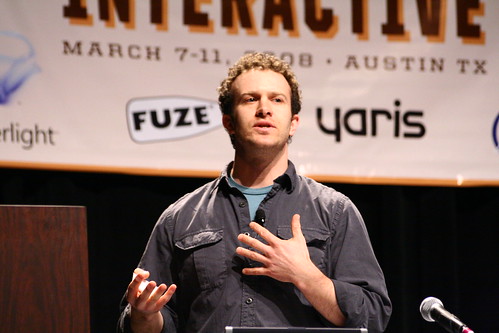
Photo Source: Deney Terrio
#1 The decisions we make today don’t have to last forever
Try new things and change them as you go along. Above all optimize for now! (37 signals recently implemented a 4 day work week, paying for hobbies and gave all employees company credit cards).
#2 When communicating with fellow employees avoid certain words
Out of the million words exchanged (distributed across geographical locations, 37 signal employees tend to communicate electronically) it was found that certain words tended to cause problems. Be careful how you communicate and pay attention to red flag words: need, can’t, easy, only and fast. e.g “It’s only one more feature, we really need it and can’t launch without it. It should be easy”. Be particularly careful about describing someone else’s work as “easy”.
#3 To be successful help other people be successful and make money
One of the reasons behind Basecamp’s success is that it is a tool to help others make money by enabling them to become more efficient at managing projects and making their client’s happy. People are more willing to spend money on your products is they can make money from it.
#4 Simplify your products and avoid competition with entrenched players
Highrise is a simplified version of Salesforce. According to Fried, Salesforce is overkill for contacts management. MS Project is overkill for project management. Many people are doing project management via email. Fly under the radar by acquiring customers that the big players have never even thought about. When basecamp first launched it didn’t have file upload capability, instant messaging but instead new features were added over time. A good way to think about digital design is to think of it as a physical device. A remote control is physically constrained in terms of how many buttons it can have. Software does not have such physical constraints but consider how your software would look if it had physical constraints.
#5 Question your work regularly
Ask the following questions: Does it make sense? Why are we doing this? What problem is this solving? Is this useful? Are we adding value? For each and every feature you implement or work task you undertake. Consider whether adding a feature will change behavior, for example does it add value to display stats such as a message count within brackets (10) to a user interface? Is this useful? Ask: will the user do something differently if it wasn’t there? If the answer is no then remove these elements because they are adding clutter. Clutter will change behaviour negatively by causing users to get frustrated and leave. Continually ask whether you are building something worthwhile.
#6 Read copy out loud
Bad copy writing is a huge problem – form labels, dialog boxes, help text. We don’t pay enough attention to copy. We are paying too much attention to pixels and not enough to words when words are the cheapest and easiest thing to fix. Re-write first, redesign second since you may find that a redesign is not even necessary and after the copy is rewritten the design will be more focussed.
#7 Err on the side of simple
“Whenever 37 signals screwed up it was because we did too much.” Begin with the easy way and see what happens. Initially, we might not deliver everything, try the easy way first and ramp up. Often we try too hard when in fact things are easy by default.
#8 The new zone is the good zone
As a goal aim to get three things done in one week instead of one thing in 3 weeks. If something takes too long then this will impact morale and motivation… the longer it takes to develop something, the less likely it is to launch.
#9 Invest in what doesn’t change
We don’t generally hear this from technology companies who are focused on what’s up and coming. Consider what core things about business work today. For Google it’s speed and accuracy. For Amazon, shipping and distribution. These things will continue to work in 10 years from now. Focus on the things people want and don’t get carried away by the next big thing.
#10 Follow the chefs and share your expertise.
Be inspired by famous chefs such as Lagasse, Oliver, Bayless, Batali. As experts and authorities in their field - these people share a lot. They have been successful in building their empires because they share their techniques. The business world is often sensitive about sharing and keeping things locked up an proprietary. The advantage of giving stuff away is that you reach a huge audience and you can build a big thing by giving stuff away.
#11 Interruption is the enemy of productivity
Close physical proximity is not always the best way to get stuff done. A fragmented day is not a productive day and it is more effective to have solid blocks of productive time. One of the techniques 37 signal uses to ensure productivity is through employing passive communication (IM, email, basecamp etc) since this reduces interruption and allows people to get to it when they’re ready. Consider creating team rules such as on Thursday afternoons no one talk to each other and then measure how much productivity increases.
#12 Road maps send you in the wrong direction
Road maps and fixed timelines for roll outs can lock you into the past. Instead set expectations and deliver the things that matter when they matter. It’s ok to think about the future, just don’t write it down. Fried recommends the Brazilian author of Maverick and 7 day weekend, Ricardo Summer.
#13 Be clear in crisis
Be open, honest, public and responsive. Being truthful builds up goodwill and telling the truth even in a down time is not such a big deal. Besides, if you don’t talk about it other people will – the web does not shut up!
#14 Make tiny decisions
Solve one thing at a time and break problems down to the atomic level. Celebrate little launches since morale feeds off progress and new stuff keeps people motivated, focus on this. When you make tiny decisions you can’t make big mistakes
#15 Make it matter
Everything you do should matter, every pixel, each blog post. Otherwise, don’t do it. Focus only on the stuff that matters, think about this when designing, writing or coding.

No comments:
Post a Comment